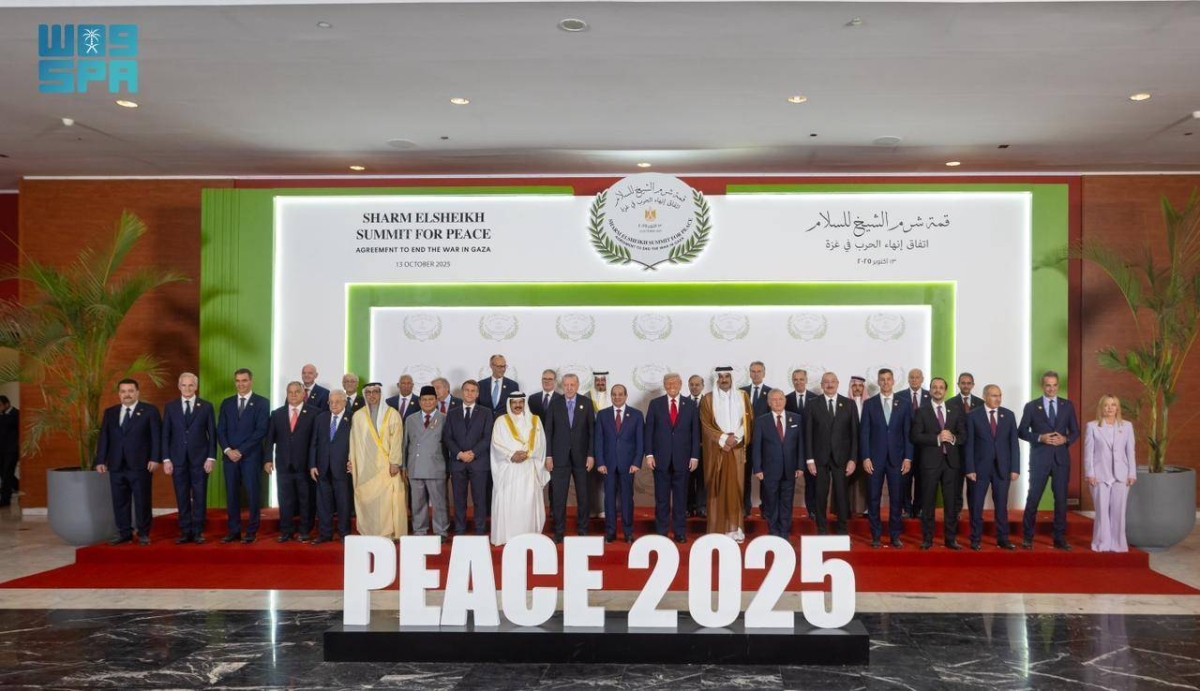On behalf of Crown Prince Mohammed bin Salman bin Abdulaziz Al Saud, Prime Minister, Prince Faisal bin Farhan bin Abdullah, Minister of Foreign Affairs, participated in the Peace Summit held in Sharm El-Sheikh, Arab Republic of Egypt, which aims to end the war in the Gaza Strip and enhance efforts to establish peace and stability in the Middle East region.
The summit was co-chaired by the President of the Arab Republic of Egypt and the President of the United States of America, with the participation of a number of leaders and representatives of countries and international organizations. At the beginning of the meeting, the agreement reached by the conflicting parties in the Gaza Strip was welcomed, and appreciation was expressed for the efforts made by the American President and the mediating countries: the State of Qatar, the Arab Republic of Egypt, and the Republic of Turkey, with confirmation of support for all efforts to achieve peace and stability in the region.
At the conclusion of the summit, the leaders of the United States, Qatar, Egypt, and Turkey signed an agreement to end the war in Gaza, as a first step toward a comprehensive ceasefire, ensuring the continued flow of aid, completing prisoner and hostage exchange operations, and working in the future on reconstruction in the Gaza Strip.
Gaza Strip
The Gaza Strip is a small coastal territory on the Mediterranean Sea that has been a strategically significant and densely populated region for millennia, with a history of rule by various empires. In the 20th century, it came under Egyptian administration after the 1948 Arab-Israeli war and was subsequently occupied by Israel following the 1967 Six-Day War. Today, it is home to over two million Palestinians and is governed by the Hamas political party, remaining a focal point of the Israeli-Palestinian conflict.
Middle East
The Middle East is a transcontinental region centered on Western Asia and Egypt, historically known as the “Cradle of Civilization” for the emergence of ancient cultures like the Sumerians and the birthplace of major world religions. Its history is marked by the rise and fall of vast empires, including the Persian, Ottoman, and Abbasid Caliphates, which shaped global trade, science, and culture. Today, it remains a geopolitically significant area, defined by its vast energy resources and its rich, diverse cultural and religious heritage.
Arab Republic of Egypt
The Arab Republic of Egypt, located in Northeast Africa, is home to one of the world’s oldest civilizations, with a recorded history spanning over 5,000 years. It is globally renowned for its ancient monuments, most notably the Pyramids of Giza and the Great Sphinx, which were built during the era of the Pharaohs. Modern Egypt is a cultural and political hub in the Arab world, with its rich heritage continuing to shape its national identity.
United States of America
The United States of America is a federal republic founded in 1776 after declaring independence from Great Britain. It grew from thirteen original colonies into a global superpower, shaped by a history of immigration, democratic ideals, and significant economic and cultural influence. The nation’s identity is deeply connected to its Constitution, which established a unique system of government with checks and balances.
State of Qatar
The State of Qatar is a sovereign nation on the northeastern coast of the Arabian Peninsula, historically known for its pearling industry and maritime trade. It transformed dramatically in the mid-20th century with the discovery of vast oil and natural gas reserves, which propelled it into a modern, high-income economy. Today, Qatar is a prominent global player, known for its futuristic architecture, hosting the 2022 FIFA World Cup, and its influential media network, Al Jazeera.
Republic of Turkey
The Republic of Turkey is a modern nation-state founded in 1923 from the remnants of the Ottoman Empire by Mustafa Kemal Atatürk. It is strategically located at the crossroads of Europe and Asia and is renowned for its rich history, which includes being home to ancient civilizations, the Byzantine Empire, and the seat of the Ottoman Sultans.
Sharm El-Sheikh
Sharm El-Sheikh is a major resort city on the southern tip of the Sinai Peninsula in Egypt, renowned for its sheltered beaches, clear waters, and coral reefs. Historically, it was a small fishing port but gained strategic importance after being occupied by Israel from 1967 to 1982. Its modern development into a world-famous tourism and conference hub began after the area was returned to Egypt.





